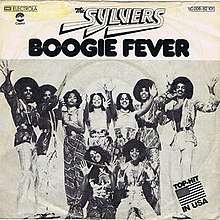Boogie Fever
"Boogie Fever" is a song recorded by Los Angeles, California-based R&B group the Sylvers, from their 1975 album Showcase. Their most lucrative single, it reached number one in the US on both the Billboard Hot 100 and Hot Soul Singles charts as well as reaching number one in Canada on the RPM national singles chart in 1976.[1] It was their third of nine Top 20 R&B hits and first top 40 pop single.[2] Billboard ranked it as the No. 20 song for 1976. "Boogie Fever" is one of two gold records by the Sylvers, the other being "Hot Line".
| "Boogie Fever" | ||||
|---|---|---|---|---|
 | ||||
| Single by the Sylvers | ||||
| from the album Showcase | ||||
| B-side | "Free Style" | |||
| Released | November 1975 | |||
| Recorded | 1975 | |||
| Genre | Disco · soul | |||
| Length | 3:29 | |||
| Label | Capitol | |||
| Songwriter(s) | Freddie Perren, Kenneth St. Lewis | |||
| Producer(s) | Freddie Perren | |||
| The Sylvers singles chronology | ||||
| ||||
Content
The narrator of the song notes a change that seems to have come over his girlfriend. At the drive-in movie, she turns down the speaker volume and turns up the radio to hear her favorite disco songs. Then, at the pizza parlor, she "boogies" to the disco beat while eating her meal. He concludes that his girl must have caught the "boogie fever" which seems to be "goin' around." In the final verse, he consults his doctor and realizes that he himself has caught the "boogie fever" as a result of dancing all night, "doin' the bump, bump, bump" with his girlfriend.
History
After being signed to Capitol Records in 1975, Larkin Arnold, then vice president, hired Motown Records veteran Freddie Perren to produce the group. Kenneth St. Lewis, a long-time collaborator with Arnold, suggested that they write a song for them using one of the popular words of the day, "boogie." The song featured all nine of the Sylvers siblings, including the youngest sisters Angelia and Pat. The lead vocal was by Edmund Sylvers; Foster Sylvers was prominently featured in the bridge singing the line: "We kept it going strong".
The bass line for the song, performed by legendary Motown bassist James Jamerson, was based upon that of "Day Tripper" by the Beatles.
The song was featured in the Stephen King miniseries The Stand (1994) and the feature film Roll Bounce (2005). In 2010, "Boogie Fever" was briefly used in a scene in Despicable Me, and in 2012 it was used in its theme park attraction adaptation, Despicable Me: Minion Mayhem. The song has also appeared in TV ads for Intel Pentium II, Old Navy and Little Caesars Pizza. An instrumental version was also music for level 1 and level 9 of the game Frantic Freddie.
Chart performance
Weekly singles charts
|
Year-end charts
All-time charts
|
References
- "Item Display - RPM - Library and Archives Canada". Collectionscanada.gc.ca. Archived from the original on 2016-06-03. Retrieved 2016-10-11.
- Whitburn, Joel (2004). Top R&B/Hip-Hop Singles: 1942-2004. Record Research. p. 563.
- Steffen Hung. "Forum - 1970 (ARIA Charts: Special Occasion Charts)". Australian-charts.com. Archived from the original on 2016-06-02. Retrieved 2016-10-11.
- "Top Singles – Volume 26, No. 14 & 15, January 08 1977". RPM. Library and Archives Canada. Archived from the original on March 19, 2016. Retrieved December 26, 2017.
- "Top Selling Singles of 1976 | The Official New Zealand Music Chart". Nztop40.co.nz. 1963-12-08. Retrieved 2016-10-11.
- "Top 100 Hits of 1976/Top 100 Songs of 1976". Musicoutfitters.com. Retrieved 2016-10-11.
- "Billboard Hot 100 60th Anniversary Interactive Chart". Billboard. Retrieved 10 December 2018.